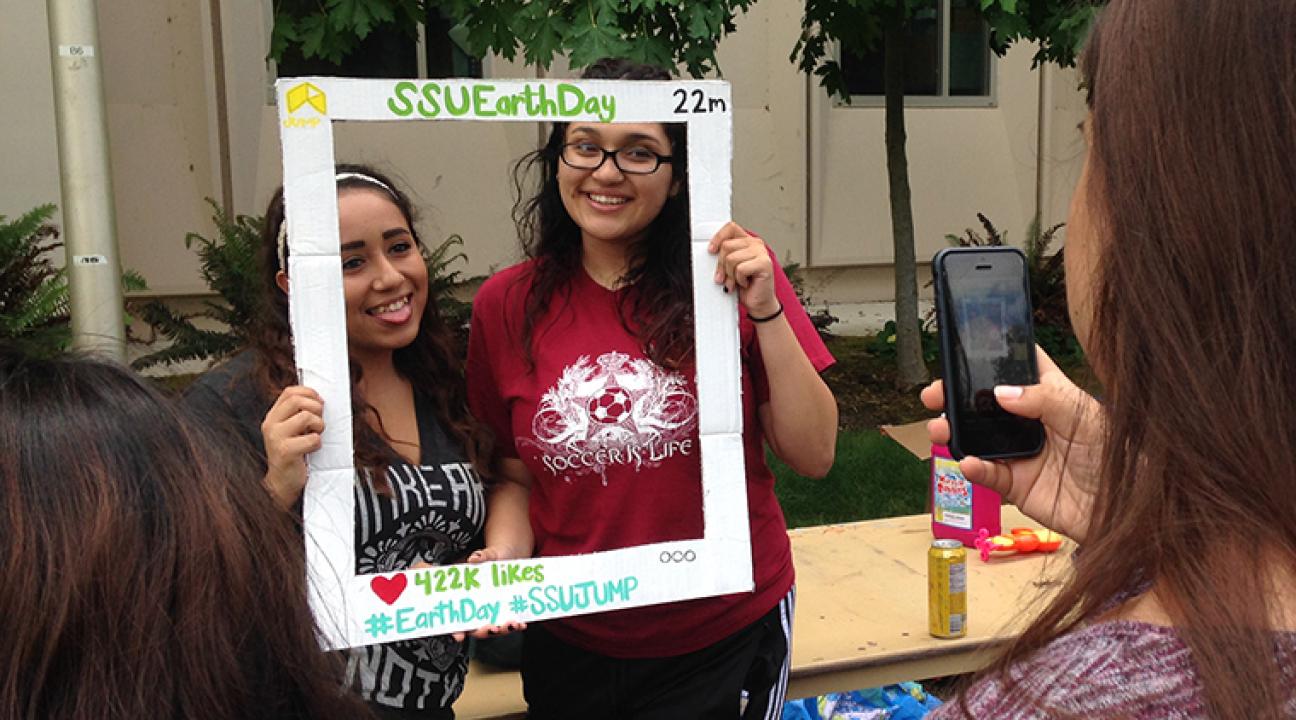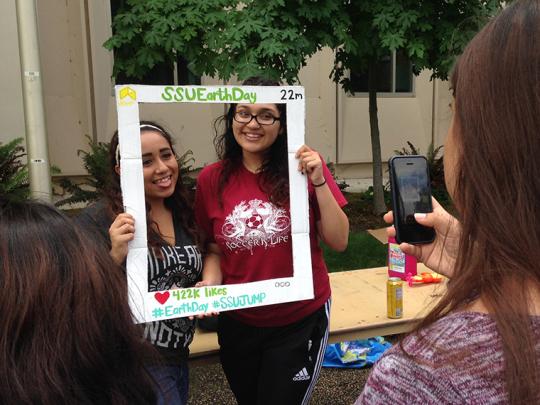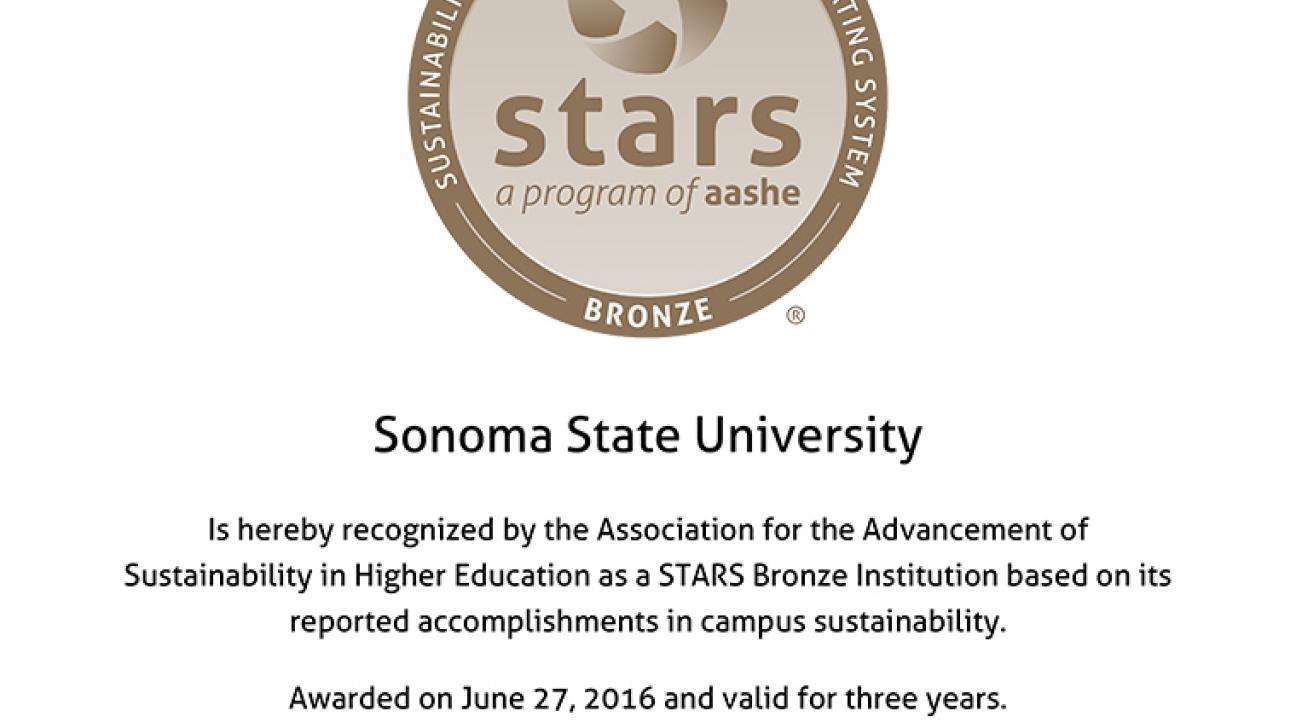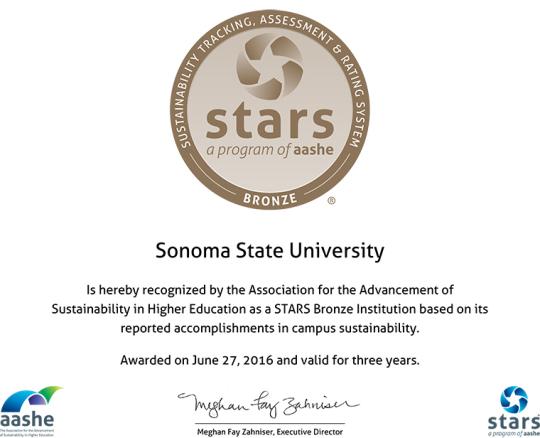Sustainability Award
University Receives International Award for Sustainability
Sonoma State University's commitment to sustainability has been recognized by one of the largest international higher education sustainability nonprofit organizations in the world. The University has received a Bronze Award from the Association for the Advancement of Sustainability in Higher Education (AASHE)'s Sustainability Tracking, Assessment and Rating System (STARS) program.
The effort was started two years ago by a group of concerned students, and followed to completion to receive this award. "As far as I know, we are the only university where the efforts are student-initiated and student-driven," says SSU Geography Professor Jeff Baldwin, a faculty advisor to the informal group.
The size of the group ranges, but has never had more than a dozen students. The group works across campus with academic areas like the Environmental Studies and Planning (ENSP) and Geography departments, as well as student organizations like the Geography and Global Studies and the Students for Sustainability clubs. "This is a group of concerned citizens acting for the good of the group," says Baldwin.
The founders include students Allison Jenks, Kara Kelly, Dustin DeMatteo and Claudia Sisomphou. All are now alumni save for Sisomphou, an ENSP major currently serving as the University's Associated Students Senator for Sustainability. "To me, this means a lot," she says. "I am beyond impressed by the work of our students and the motivation to get this done because it's a huge project to take on. We were doing it because it was important."
SSU is one of 787 institutions around the world using the STARS tool and one of eight campuses in the 23-campus California State University system with a STARS award. Rated institutions are also featured in the highly regarded Sustainable Campus Index, an annual publication highlighting top performers and best practices in 17 impact areas covering academics, community engagement, campus operations, and leadership.
"AASHE was founded with the idea that college campuses could help lead us toward a more sustainable society," says Baldwin, who commutes to work most days on his bicycle and includes sustainability as an important part of his geography curriculum.
Sisomphou organized the student group knowing the process would not be quick or easy. "Our goal for the first year was not to collect any data for the STARS report, but to decide how this group would operate," she says. Students later did research on campus, wrote the descriptions and put them into the report.
The process was assisted within the University by the Sustainability Executive Committee working with the Office of Academic Affairs and the Office of the President.
In addition to offering many academic programs and classes focused on the environment and sustainability, the University supports composting on campus and in dining facilities, uses sustainable cleaning products, applies water conservation methods in dining and landscaping, and strives to employ sustainable practices throughout campus. In 2014, SSU Campus Recreation received a Green Business Certificate from the Bay Area Green Business Program.
In the community, the University supports the annual Sustainable Enterprise Conference in Rohnert Park and for the past three years, SSU has invited the surrounding community to participate in its Sustainability Days conference on campus. This year's Sustainability Days event includes a keynote address from noted climate change journalist Bill McKibben.
Now that they're familiar with the process and paperwork, both Sisomphou and Baldwin believe Sonoma State is capable of achieving a higher STARS rating. SSU received 37.5 points on the STARS system; 25 points are needed for a Bronze award and 45 for Silver.
"I think there's a lot we can learn from this report on areas we can focus on to really improve our sustainability," says Sisomphou. "We think this is a very unique campus and we're happy that our STARS report was done in a very unique way."
About STARS
The Sustainability Tracking, Assessment and Rating System (STARS) is a transparent, self-reporting framework for colleges and universities to measure their sustainability performance. STARS is intended to engage and recognize the full spectrum of colleges and universities--from community colleges to research universities, and from institutions just starting their sustainability programs to long-time campus sustainability leaders. STARS encompasses long-term sustainability goals for already high-achieving institutions as well as entry points of recognition for institutions that are taking first steps toward sustainability.
STARS is composed up of credits that span the breadth of higher education sustainability and include performance indicators and criteria organized into four categories: Academics, Engagement, Operations, and Planning & Administration (see the STARS Technical Manual for details).
Participating institutions are eligible to earn a STARS Bronze, Silver, Gold or Platinum rating or recognition as a STARS Reporter. Rated institutions are also featured in the highly regarded Sustainable Campus Index, an annual publication that highlights top performers and best practices in 17 impact areas covering academics, community engagement, campus operations, and leadership.





